Entrepreneurship & Small Business Management: In-depth Analysis Report
VerifiedAdded on 2020/11/23
|18
|5198
|237
Report
AI Summary
This report provides an overview of entrepreneurship and small business management, including different types of entrepreneurial ventures such as micro, small, medium, and large enterprises, and their relation to various typologies like start-ups, large companies, social enterprises, and lifestyle enterprises. It differentiates between intrapreneurs, serial entrepreneurs, and owner managers, highlighting their roles, objectives, and scopes. The report also discusses the public and corporate sectors, examining the scope, growth, and development of entrepreneurial ventures within them, using National Rail and Eagle Food Ltd as examples. Furthermore, it assesses the impact of small and micro businesses on the UK economy, explores the characteristics and skills of successful entrepreneurs, analyzes the motivational drivers behind their success, and considers their backgrounds and experiences. Desklib provides similar solved assignments and past papers for students.
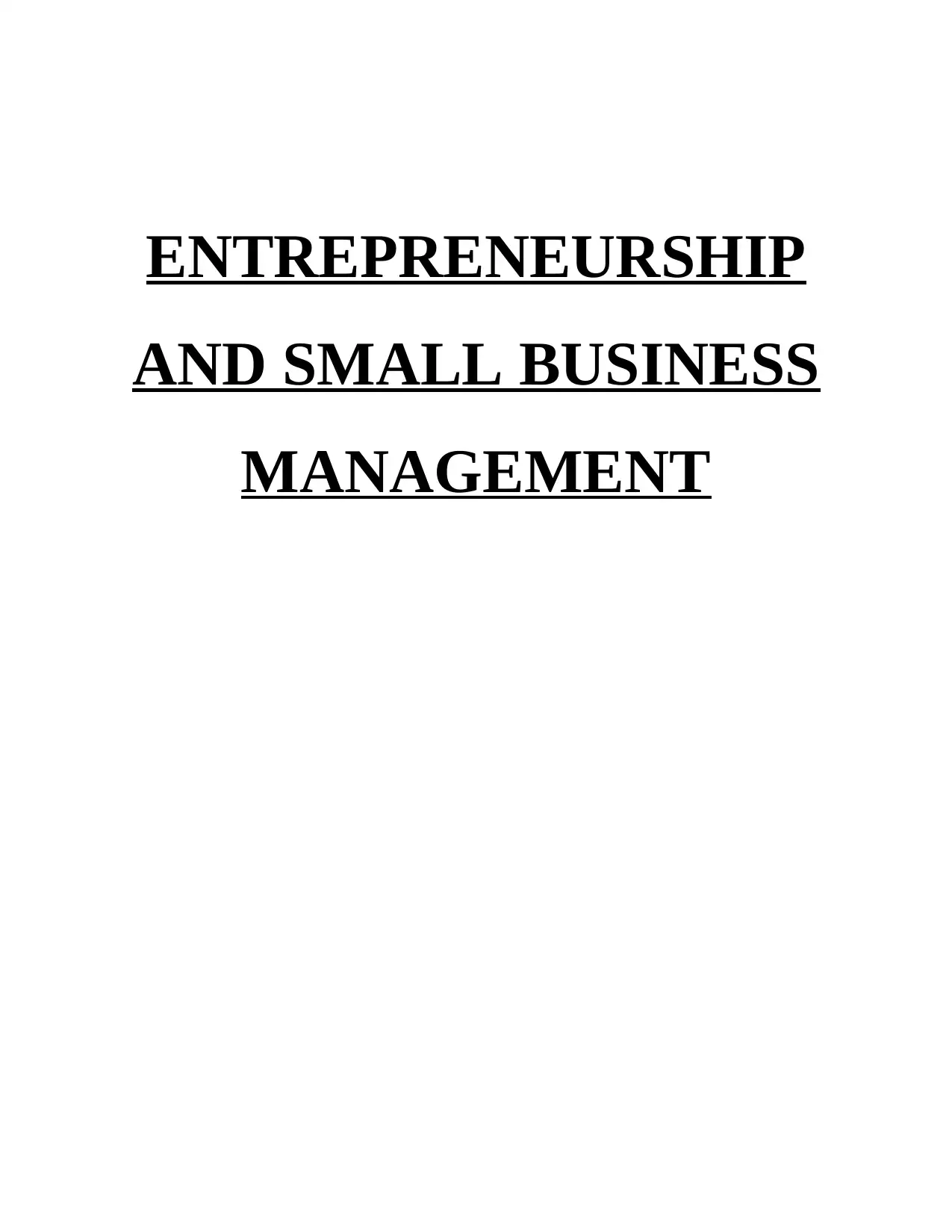
ENTREPRENEURSHIP
AND SMALL BUSINESS
MANAGEMENT
AND SMALL BUSINESS
MANAGEMENT
Paraphrase This Document
Need a fresh take? Get an instant paraphrase of this document with our AI Paraphraser
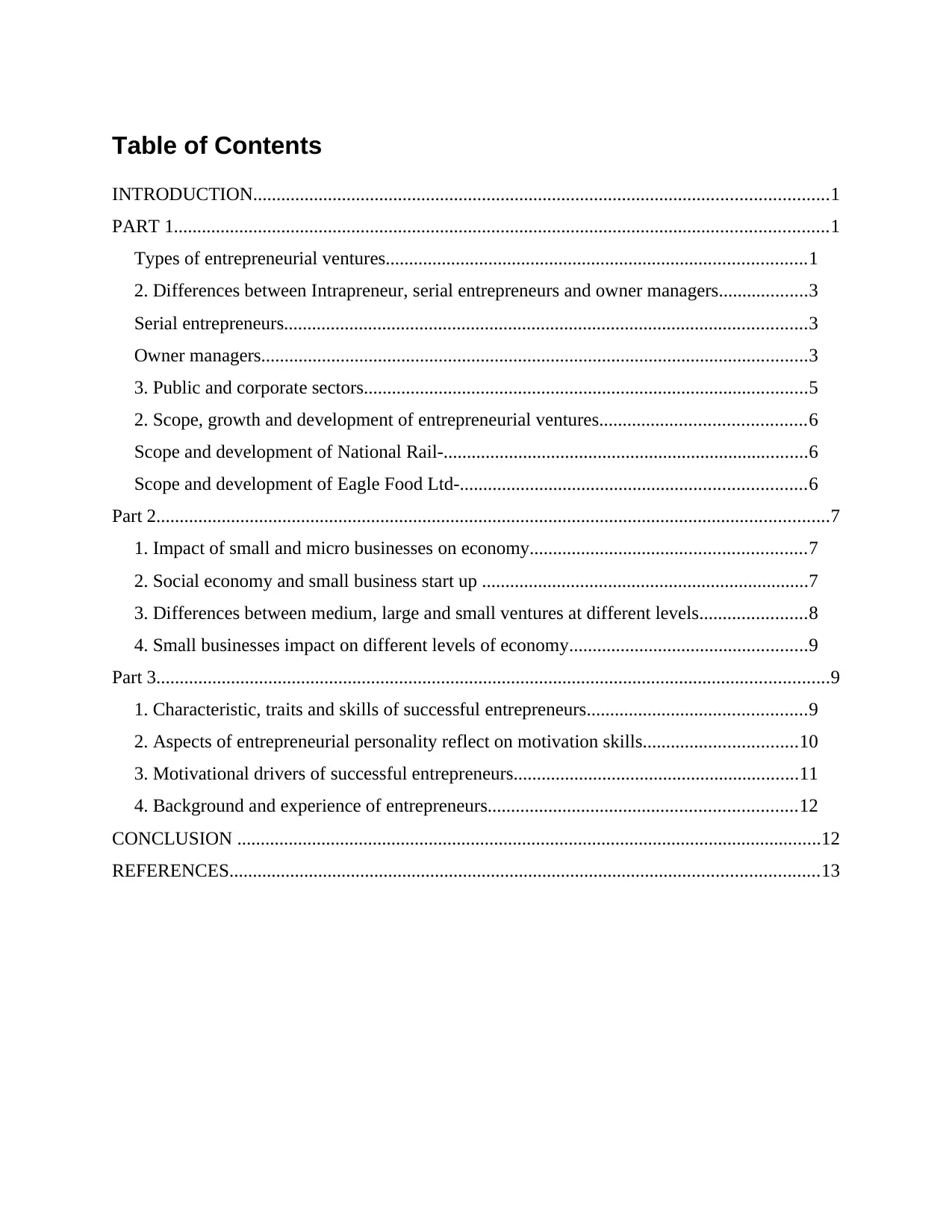
Table of Contents
INTRODUCTION...........................................................................................................................1
PART 1............................................................................................................................................1
Types of entrepreneurial ventures..........................................................................................1
2. Differences between Intrapreneur, serial entrepreneurs and owner managers...................3
Serial entrepreneurs................................................................................................................3
Owner managers.....................................................................................................................3
3. Public and corporate sectors...............................................................................................5
2. Scope, growth and development of entrepreneurial ventures............................................6
Scope and development of National Rail-..............................................................................6
Scope and development of Eagle Food Ltd-..........................................................................6
Part 2................................................................................................................................................7
1. Impact of small and micro businesses on economy...........................................................7
2. Social economy and small business start up ......................................................................7
3. Differences between medium, large and small ventures at different levels.......................8
4. Small businesses impact on different levels of economy...................................................9
Part 3................................................................................................................................................9
1. Characteristic, traits and skills of successful entrepreneurs...............................................9
2. Aspects of entrepreneurial personality reflect on motivation skills.................................10
3. Motivational drivers of successful entrepreneurs.............................................................11
4. Background and experience of entrepreneurs..................................................................12
CONCLUSION .............................................................................................................................12
REFERENCES..............................................................................................................................13
INTRODUCTION...........................................................................................................................1
PART 1............................................................................................................................................1
Types of entrepreneurial ventures..........................................................................................1
2. Differences between Intrapreneur, serial entrepreneurs and owner managers...................3
Serial entrepreneurs................................................................................................................3
Owner managers.....................................................................................................................3
3. Public and corporate sectors...............................................................................................5
2. Scope, growth and development of entrepreneurial ventures............................................6
Scope and development of National Rail-..............................................................................6
Scope and development of Eagle Food Ltd-..........................................................................6
Part 2................................................................................................................................................7
1. Impact of small and micro businesses on economy...........................................................7
2. Social economy and small business start up ......................................................................7
3. Differences between medium, large and small ventures at different levels.......................8
4. Small businesses impact on different levels of economy...................................................9
Part 3................................................................................................................................................9
1. Characteristic, traits and skills of successful entrepreneurs...............................................9
2. Aspects of entrepreneurial personality reflect on motivation skills.................................10
3. Motivational drivers of successful entrepreneurs.............................................................11
4. Background and experience of entrepreneurs..................................................................12
CONCLUSION .............................................................................................................................12
REFERENCES..............................................................................................................................13
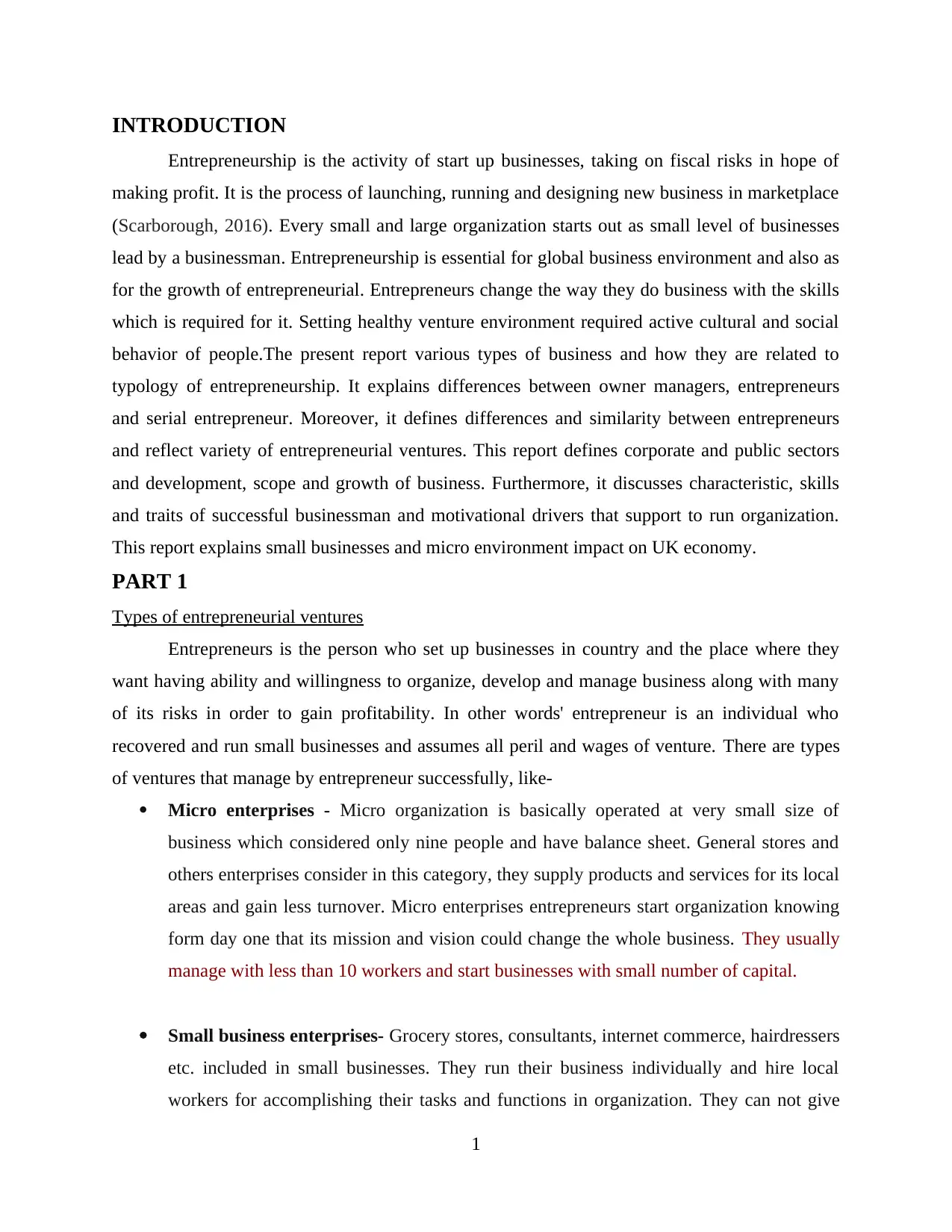
INTRODUCTION
Entrepreneurship is the activity of start up businesses, taking on fiscal risks in hope of
making profit. It is the process of launching, running and designing new business in marketplace
(Scarborough, 2016). Every small and large organization starts out as small level of businesses
lead by a businessman. Entrepreneurship is essential for global business environment and also as
for the growth of entrepreneurial. Entrepreneurs change the way they do business with the skills
which is required for it. Setting healthy venture environment required active cultural and social
behavior of people.The present report various types of business and how they are related to
typology of entrepreneurship. It explains differences between owner managers, entrepreneurs
and serial entrepreneur. Moreover, it defines differences and similarity between entrepreneurs
and reflect variety of entrepreneurial ventures. This report defines corporate and public sectors
and development, scope and growth of business. Furthermore, it discusses characteristic, skills
and traits of successful businessman and motivational drivers that support to run organization.
This report explains small businesses and micro environment impact on UK economy.
PART 1
Types of entrepreneurial ventures
Entrepreneurs is the person who set up businesses in country and the place where they
want having ability and willingness to organize, develop and manage business along with many
of its risks in order to gain profitability. In other words' entrepreneur is an individual who
recovered and run small businesses and assumes all peril and wages of venture. There are types
of ventures that manage by entrepreneur successfully, like-
Micro enterprises - Micro organization is basically operated at very small size of
business which considered only nine people and have balance sheet. General stores and
others enterprises consider in this category, they supply products and services for its local
areas and gain less turnover. Micro enterprises entrepreneurs start organization knowing
form day one that its mission and vision could change the whole business. They usually
manage with less than 10 workers and start businesses with small number of capital.
Small business enterprises- Grocery stores, consultants, internet commerce, hairdressers
etc. included in small businesses. They run their business individually and hire local
workers for accomplishing their tasks and functions in organization. They can not give
1
Entrepreneurship is the activity of start up businesses, taking on fiscal risks in hope of
making profit. It is the process of launching, running and designing new business in marketplace
(Scarborough, 2016). Every small and large organization starts out as small level of businesses
lead by a businessman. Entrepreneurship is essential for global business environment and also as
for the growth of entrepreneurial. Entrepreneurs change the way they do business with the skills
which is required for it. Setting healthy venture environment required active cultural and social
behavior of people.The present report various types of business and how they are related to
typology of entrepreneurship. It explains differences between owner managers, entrepreneurs
and serial entrepreneur. Moreover, it defines differences and similarity between entrepreneurs
and reflect variety of entrepreneurial ventures. This report defines corporate and public sectors
and development, scope and growth of business. Furthermore, it discusses characteristic, skills
and traits of successful businessman and motivational drivers that support to run organization.
This report explains small businesses and micro environment impact on UK economy.
PART 1
Types of entrepreneurial ventures
Entrepreneurs is the person who set up businesses in country and the place where they
want having ability and willingness to organize, develop and manage business along with many
of its risks in order to gain profitability. In other words' entrepreneur is an individual who
recovered and run small businesses and assumes all peril and wages of venture. There are types
of ventures that manage by entrepreneur successfully, like-
Micro enterprises - Micro organization is basically operated at very small size of
business which considered only nine people and have balance sheet. General stores and
others enterprises consider in this category, they supply products and services for its local
areas and gain less turnover. Micro enterprises entrepreneurs start organization knowing
form day one that its mission and vision could change the whole business. They usually
manage with less than 10 workers and start businesses with small number of capital.
Small business enterprises- Grocery stores, consultants, internet commerce, hairdressers
etc. included in small businesses. They run their business individually and hire local
workers for accomplishing their tasks and functions in organization. They can not give
1
⊘ This is a preview!⊘
Do you want full access?
Subscribe today to unlock all pages.

Trusted by 1+ million students worldwide
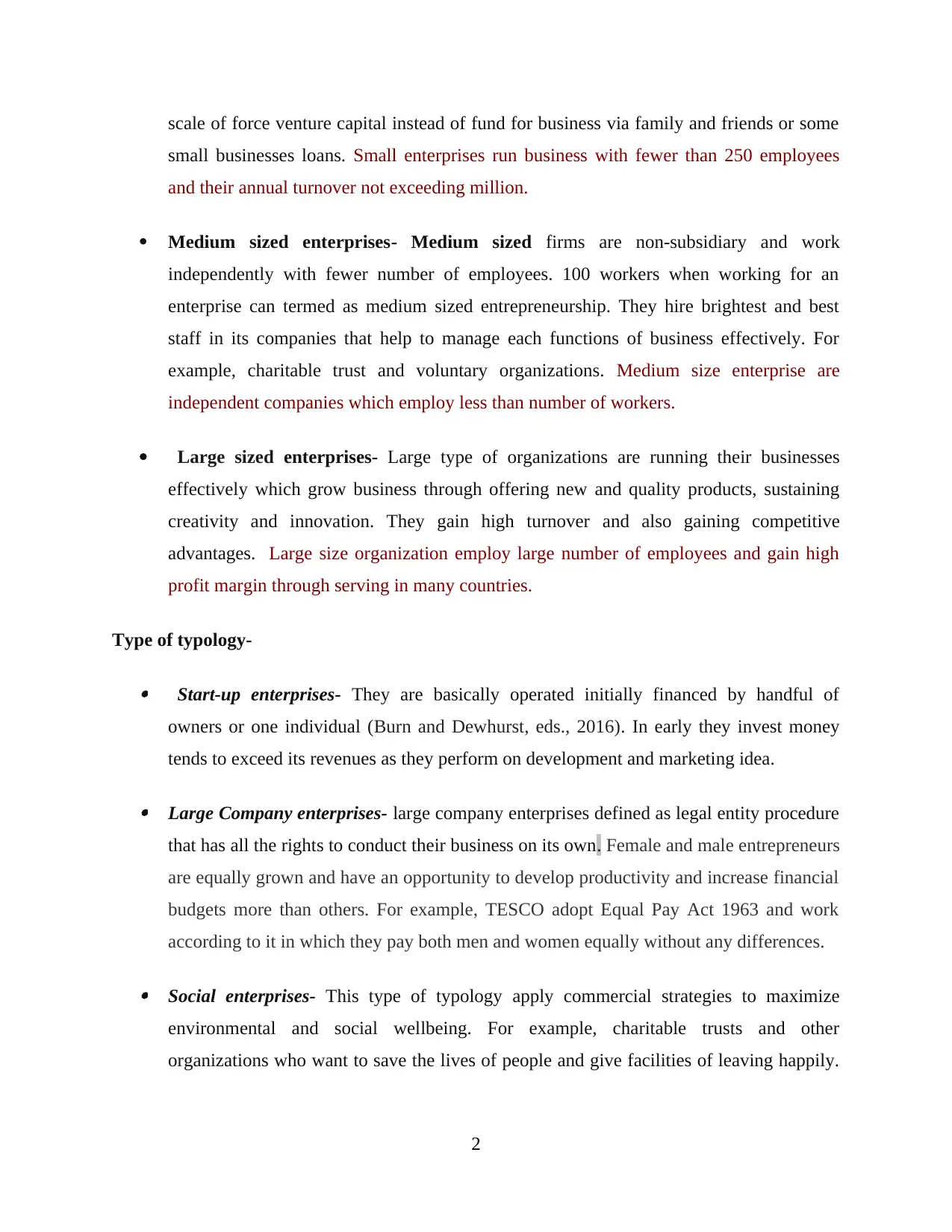
scale of force venture capital instead of fund for business via family and friends or some
small businesses loans. Small enterprises run business with fewer than 250 employees
and their annual turnover not exceeding million.
Medium sized enterprises- Medium sized firms are non-subsidiary and work
independently with fewer number of employees. 100 workers when working for an
enterprise can termed as medium sized entrepreneurship. They hire brightest and best
staff in its companies that help to manage each functions of business effectively. For
example, charitable trust and voluntary organizations. Medium size enterprise are
independent companies which employ less than number of workers.
Large sized enterprises- Large type of organizations are running their businesses
effectively which grow business through offering new and quality products, sustaining
creativity and innovation. They gain high turnover and also gaining competitive
advantages. Large size organization employ large number of employees and gain high
profit margin through serving in many countries.
Type of typology-
Start-up enterprises- They are basically operated initially financed by handful of
owners or one individual (Burn and Dewhurst, eds., 2016). In early they invest money
tends to exceed its revenues as they perform on development and marketing idea.
Large Company enterprises- large company enterprises defined as legal entity procedure
that has all the rights to conduct their business on its own. Female and male entrepreneurs
are equally grown and have an opportunity to develop productivity and increase financial
budgets more than others. For example, TESCO adopt Equal Pay Act 1963 and work
according to it in which they pay both men and women equally without any differences.
Social enterprises- This type of typology apply commercial strategies to maximize
environmental and social wellbeing. For example, charitable trusts and other
organizations who want to save the lives of people and give facilities of leaving happily.
2
small businesses loans. Small enterprises run business with fewer than 250 employees
and their annual turnover not exceeding million.
Medium sized enterprises- Medium sized firms are non-subsidiary and work
independently with fewer number of employees. 100 workers when working for an
enterprise can termed as medium sized entrepreneurship. They hire brightest and best
staff in its companies that help to manage each functions of business effectively. For
example, charitable trust and voluntary organizations. Medium size enterprise are
independent companies which employ less than number of workers.
Large sized enterprises- Large type of organizations are running their businesses
effectively which grow business through offering new and quality products, sustaining
creativity and innovation. They gain high turnover and also gaining competitive
advantages. Large size organization employ large number of employees and gain high
profit margin through serving in many countries.
Type of typology-
Start-up enterprises- They are basically operated initially financed by handful of
owners or one individual (Burn and Dewhurst, eds., 2016). In early they invest money
tends to exceed its revenues as they perform on development and marketing idea.
Large Company enterprises- large company enterprises defined as legal entity procedure
that has all the rights to conduct their business on its own. Female and male entrepreneurs
are equally grown and have an opportunity to develop productivity and increase financial
budgets more than others. For example, TESCO adopt Equal Pay Act 1963 and work
according to it in which they pay both men and women equally without any differences.
Social enterprises- This type of typology apply commercial strategies to maximize
environmental and social wellbeing. For example, charitable trusts and other
organizations who want to save the lives of people and give facilities of leaving happily.
2
Paraphrase This Document
Need a fresh take? Get an instant paraphrase of this document with our AI Paraphraser
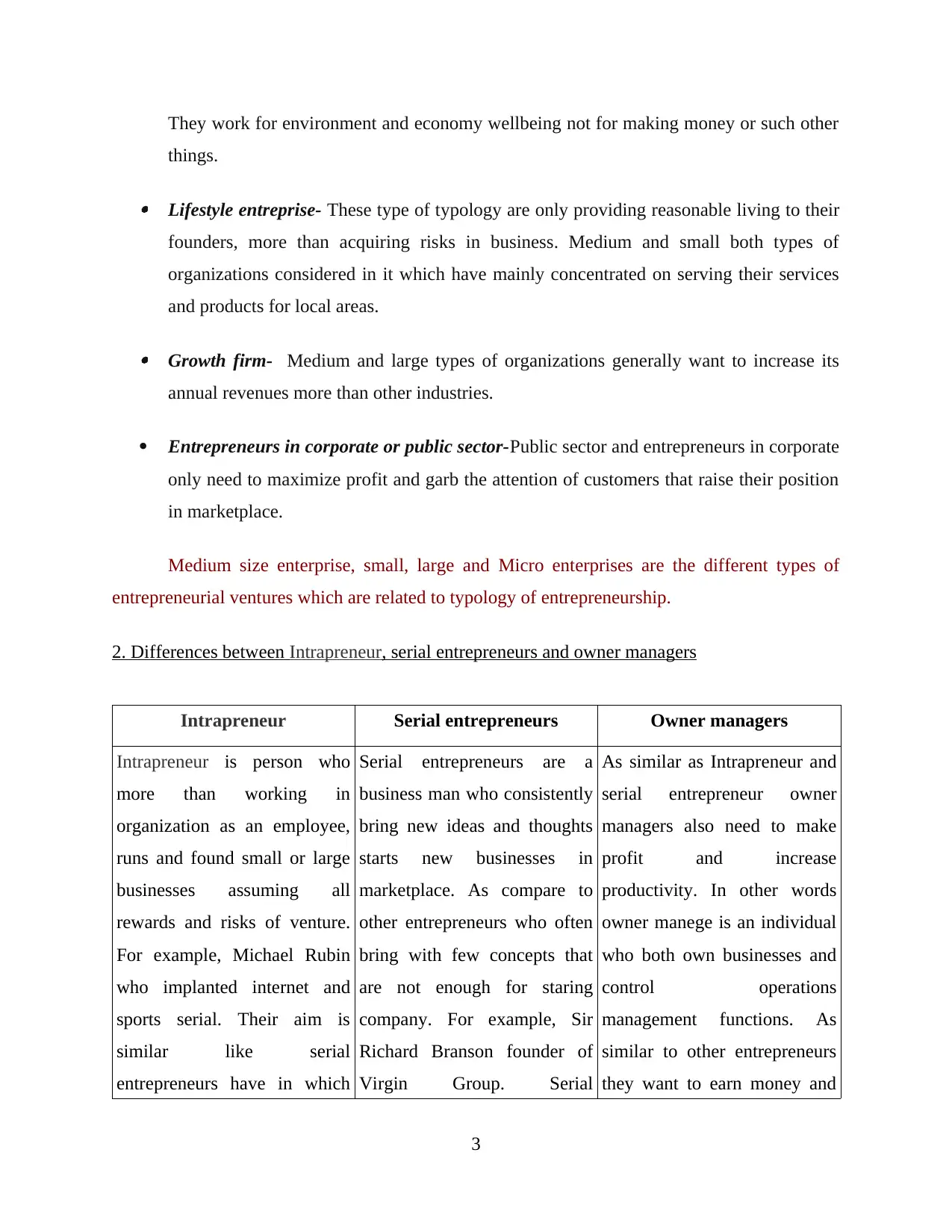
They work for environment and economy wellbeing not for making money or such other
things.
Lifestyle entreprise- These type of typology are only providing reasonable living to their
founders, more than acquiring risks in business. Medium and small both types of
organizations considered in it which have mainly concentrated on serving their services
and products for local areas.
Growth firm- Medium and large types of organizations generally want to increase its
annual revenues more than other industries.
Entrepreneurs in corporate or public sector-Public sector and entrepreneurs in corporate
only need to maximize profit and garb the attention of customers that raise their position
in marketplace.
Medium size enterprise, small, large and Micro enterprises are the different types of
entrepreneurial ventures which are related to typology of entrepreneurship.
2. Differences between Intrapreneur, serial entrepreneurs and owner managers
Intrapreneur Serial entrepreneurs Owner managers
Intrapreneur is person who
more than working in
organization as an employee,
runs and found small or large
businesses assuming all
rewards and risks of venture.
For example, Michael Rubin
who implanted internet and
sports serial. Their aim is
similar like serial
entrepreneurs have in which
Serial entrepreneurs are a
business man who consistently
bring new ideas and thoughts
starts new businesses in
marketplace. As compare to
other entrepreneurs who often
bring with few concepts that
are not enough for staring
company. For example, Sir
Richard Branson founder of
Virgin Group. Serial
As similar as Intrapreneur and
serial entrepreneur owner
managers also need to make
profit and increase
productivity. In other words
owner manege is an individual
who both own businesses and
control operations
management functions. As
similar to other entrepreneurs
they want to earn money and
3
things.
Lifestyle entreprise- These type of typology are only providing reasonable living to their
founders, more than acquiring risks in business. Medium and small both types of
organizations considered in it which have mainly concentrated on serving their services
and products for local areas.
Growth firm- Medium and large types of organizations generally want to increase its
annual revenues more than other industries.
Entrepreneurs in corporate or public sector-Public sector and entrepreneurs in corporate
only need to maximize profit and garb the attention of customers that raise their position
in marketplace.
Medium size enterprise, small, large and Micro enterprises are the different types of
entrepreneurial ventures which are related to typology of entrepreneurship.
2. Differences between Intrapreneur, serial entrepreneurs and owner managers
Intrapreneur Serial entrepreneurs Owner managers
Intrapreneur is person who
more than working in
organization as an employee,
runs and found small or large
businesses assuming all
rewards and risks of venture.
For example, Michael Rubin
who implanted internet and
sports serial. Their aim is
similar like serial
entrepreneurs have in which
Serial entrepreneurs are a
business man who consistently
bring new ideas and thoughts
starts new businesses in
marketplace. As compare to
other entrepreneurs who often
bring with few concepts that
are not enough for staring
company. For example, Sir
Richard Branson founder of
Virgin Group. Serial
As similar as Intrapreneur and
serial entrepreneur owner
managers also need to make
profit and increase
productivity. In other words
owner manege is an individual
who both own businesses and
control operations
management functions. As
similar to other entrepreneurs
they want to earn money and
3
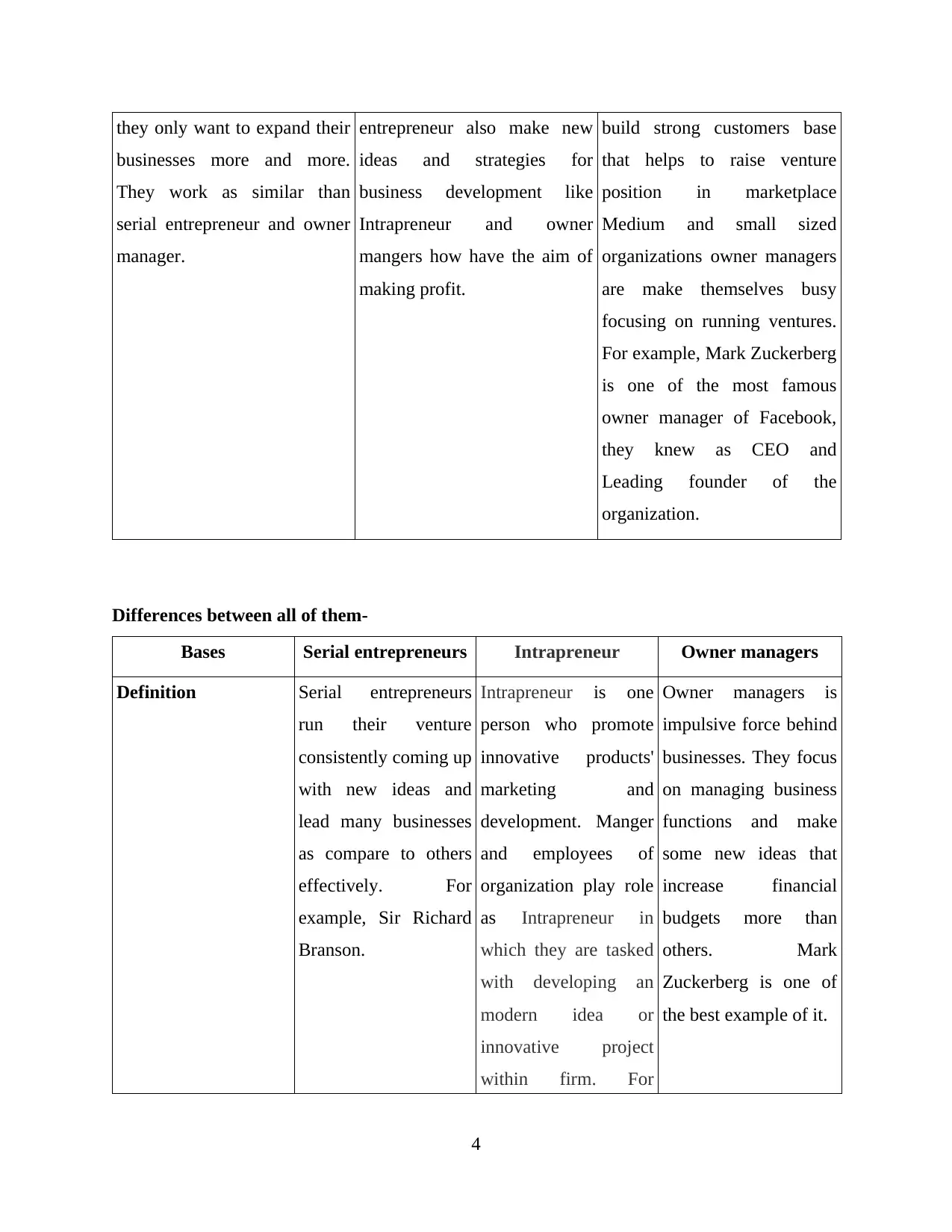
they only want to expand their
businesses more and more.
They work as similar than
serial entrepreneur and owner
manager.
entrepreneur also make new
ideas and strategies for
business development like
Intrapreneur and owner
mangers how have the aim of
making profit.
build strong customers base
that helps to raise venture
position in marketplace
Medium and small sized
organizations owner managers
are make themselves busy
focusing on running ventures.
For example, Mark Zuckerberg
is one of the most famous
owner manager of Facebook,
they knew as CEO and
Leading founder of the
organization.
Differences between all of them-
Bases Serial entrepreneurs Intrapreneur Owner managers
Definition Serial entrepreneurs
run their venture
consistently coming up
with new ideas and
lead many businesses
as compare to others
effectively. For
example, Sir Richard
Branson.
Intrapreneur is one
person who promote
innovative products'
marketing and
development. Manger
and employees of
organization play role
as Intrapreneur in
which they are tasked
with developing an
modern idea or
innovative project
within firm. For
Owner managers is
impulsive force behind
businesses. They focus
on managing business
functions and make
some new ideas that
increase financial
budgets more than
others. Mark
Zuckerberg is one of
the best example of it.
4
businesses more and more.
They work as similar than
serial entrepreneur and owner
manager.
entrepreneur also make new
ideas and strategies for
business development like
Intrapreneur and owner
mangers how have the aim of
making profit.
build strong customers base
that helps to raise venture
position in marketplace
Medium and small sized
organizations owner managers
are make themselves busy
focusing on running ventures.
For example, Mark Zuckerberg
is one of the most famous
owner manager of Facebook,
they knew as CEO and
Leading founder of the
organization.
Differences between all of them-
Bases Serial entrepreneurs Intrapreneur Owner managers
Definition Serial entrepreneurs
run their venture
consistently coming up
with new ideas and
lead many businesses
as compare to others
effectively. For
example, Sir Richard
Branson.
Intrapreneur is one
person who promote
innovative products'
marketing and
development. Manger
and employees of
organization play role
as Intrapreneur in
which they are tasked
with developing an
modern idea or
innovative project
within firm. For
Owner managers is
impulsive force behind
businesses. They focus
on managing business
functions and make
some new ideas that
increase financial
budgets more than
others. Mark
Zuckerberg is one of
the best example of it.
4
⊘ This is a preview!⊘
Do you want full access?
Subscribe today to unlock all pages.

Trusted by 1+ million students worldwide
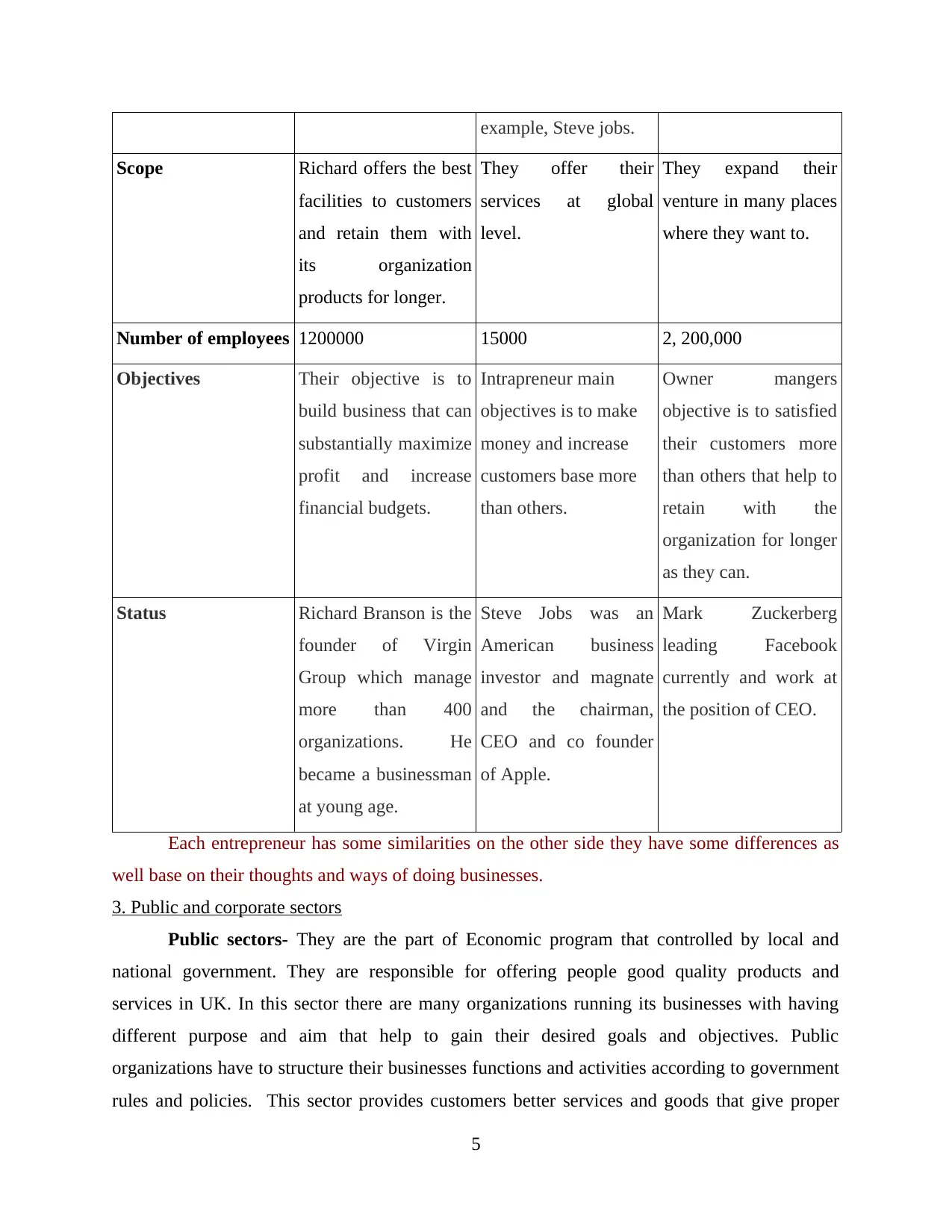
example, Steve jobs.
Scope Richard offers the best
facilities to customers
and retain them with
its organization
products for longer.
They offer their
services at global
level.
They expand their
venture in many places
where they want to.
Number of employees 1200000 15000 2, 200,000
Objectives Their objective is to
build business that can
substantially maximize
profit and increase
financial budgets.
Intrapreneur main
objectives is to make
money and increase
customers base more
than others.
Owner mangers
objective is to satisfied
their customers more
than others that help to
retain with the
organization for longer
as they can.
Status Richard Branson is the
founder of Virgin
Group which manage
more than 400
organizations. He
became a businessman
at young age.
Steve Jobs was an
American business
investor and magnate
and the chairman,
CEO and co founder
of Apple.
Mark Zuckerberg
leading Facebook
currently and work at
the position of CEO.
Each entrepreneur has some similarities on the other side they have some differences as
well base on their thoughts and ways of doing businesses.
3. Public and corporate sectors
Public sectors- They are the part of Economic program that controlled by local and
national government. They are responsible for offering people good quality products and
services in UK. In this sector there are many organizations running its businesses with having
different purpose and aim that help to gain their desired goals and objectives. Public
organizations have to structure their businesses functions and activities according to government
rules and policies. This sector provides customers better services and goods that give proper
5
Scope Richard offers the best
facilities to customers
and retain them with
its organization
products for longer.
They offer their
services at global
level.
They expand their
venture in many places
where they want to.
Number of employees 1200000 15000 2, 200,000
Objectives Their objective is to
build business that can
substantially maximize
profit and increase
financial budgets.
Intrapreneur main
objectives is to make
money and increase
customers base more
than others.
Owner mangers
objective is to satisfied
their customers more
than others that help to
retain with the
organization for longer
as they can.
Status Richard Branson is the
founder of Virgin
Group which manage
more than 400
organizations. He
became a businessman
at young age.
Steve Jobs was an
American business
investor and magnate
and the chairman,
CEO and co founder
of Apple.
Mark Zuckerberg
leading Facebook
currently and work at
the position of CEO.
Each entrepreneur has some similarities on the other side they have some differences as
well base on their thoughts and ways of doing businesses.
3. Public and corporate sectors
Public sectors- They are the part of Economic program that controlled by local and
national government. They are responsible for offering people good quality products and
services in UK. In this sector there are many organizations running its businesses with having
different purpose and aim that help to gain their desired goals and objectives. Public
organizations have to structure their businesses functions and activities according to government
rules and policies. This sector provides customers better services and goods that give proper
5
Paraphrase This Document
Need a fresh take? Get an instant paraphrase of this document with our AI Paraphraser
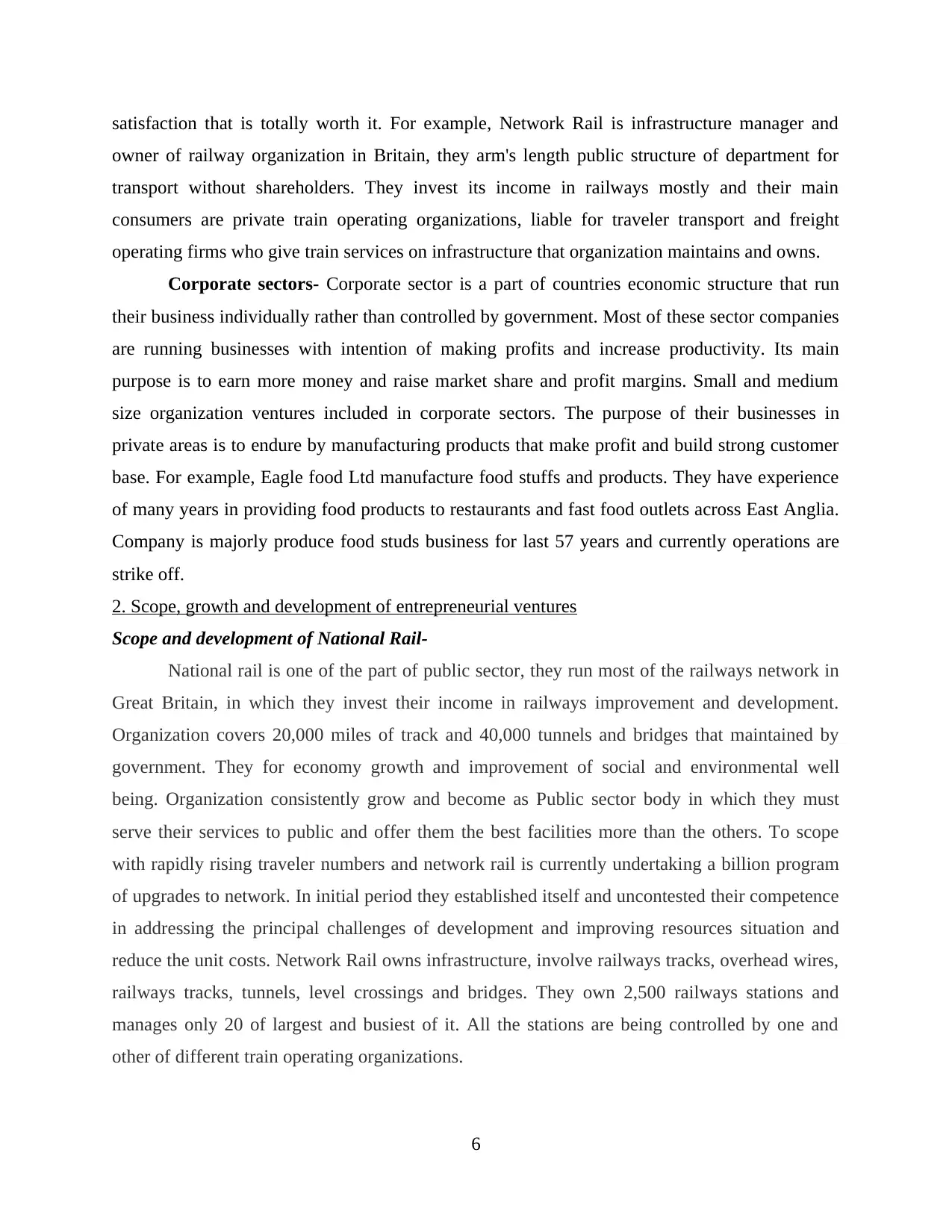
satisfaction that is totally worth it. For example, Network Rail is infrastructure manager and
owner of railway organization in Britain, they arm's length public structure of department for
transport without shareholders. They invest its income in railways mostly and their main
consumers are private train operating organizations, liable for traveler transport and freight
operating firms who give train services on infrastructure that organization maintains and owns.
Corporate sectors- Corporate sector is a part of countries economic structure that run
their business individually rather than controlled by government. Most of these sector companies
are running businesses with intention of making profits and increase productivity. Its main
purpose is to earn more money and raise market share and profit margins. Small and medium
size organization ventures included in corporate sectors. The purpose of their businesses in
private areas is to endure by manufacturing products that make profit and build strong customer
base. For example, Eagle food Ltd manufacture food stuffs and products. They have experience
of many years in providing food products to restaurants and fast food outlets across East Anglia.
Company is majorly produce food studs business for last 57 years and currently operations are
strike off.
2. Scope, growth and development of entrepreneurial ventures
Scope and development of National Rail-
National rail is one of the part of public sector, they run most of the railways network in
Great Britain, in which they invest their income in railways improvement and development.
Organization covers 20,000 miles of track and 40,000 tunnels and bridges that maintained by
government. They for economy growth and improvement of social and environmental well
being. Organization consistently grow and become as Public sector body in which they must
serve their services to public and offer them the best facilities more than the others. To scope
with rapidly rising traveler numbers and network rail is currently undertaking a billion program
of upgrades to network. In initial period they established itself and uncontested their competence
in addressing the principal challenges of development and improving resources situation and
reduce the unit costs. Network Rail owns infrastructure, involve railways tracks, overhead wires,
railways tracks, tunnels, level crossings and bridges. They own 2,500 railways stations and
manages only 20 of largest and busiest of it. All the stations are being controlled by one and
other of different train operating organizations.
6
owner of railway organization in Britain, they arm's length public structure of department for
transport without shareholders. They invest its income in railways mostly and their main
consumers are private train operating organizations, liable for traveler transport and freight
operating firms who give train services on infrastructure that organization maintains and owns.
Corporate sectors- Corporate sector is a part of countries economic structure that run
their business individually rather than controlled by government. Most of these sector companies
are running businesses with intention of making profits and increase productivity. Its main
purpose is to earn more money and raise market share and profit margins. Small and medium
size organization ventures included in corporate sectors. The purpose of their businesses in
private areas is to endure by manufacturing products that make profit and build strong customer
base. For example, Eagle food Ltd manufacture food stuffs and products. They have experience
of many years in providing food products to restaurants and fast food outlets across East Anglia.
Company is majorly produce food studs business for last 57 years and currently operations are
strike off.
2. Scope, growth and development of entrepreneurial ventures
Scope and development of National Rail-
National rail is one of the part of public sector, they run most of the railways network in
Great Britain, in which they invest their income in railways improvement and development.
Organization covers 20,000 miles of track and 40,000 tunnels and bridges that maintained by
government. They for economy growth and improvement of social and environmental well
being. Organization consistently grow and become as Public sector body in which they must
serve their services to public and offer them the best facilities more than the others. To scope
with rapidly rising traveler numbers and network rail is currently undertaking a billion program
of upgrades to network. In initial period they established itself and uncontested their competence
in addressing the principal challenges of development and improving resources situation and
reduce the unit costs. Network Rail owns infrastructure, involve railways tracks, overhead wires,
railways tracks, tunnels, level crossings and bridges. They own 2,500 railways stations and
manages only 20 of largest and busiest of it. All the stations are being controlled by one and
other of different train operating organizations.
6
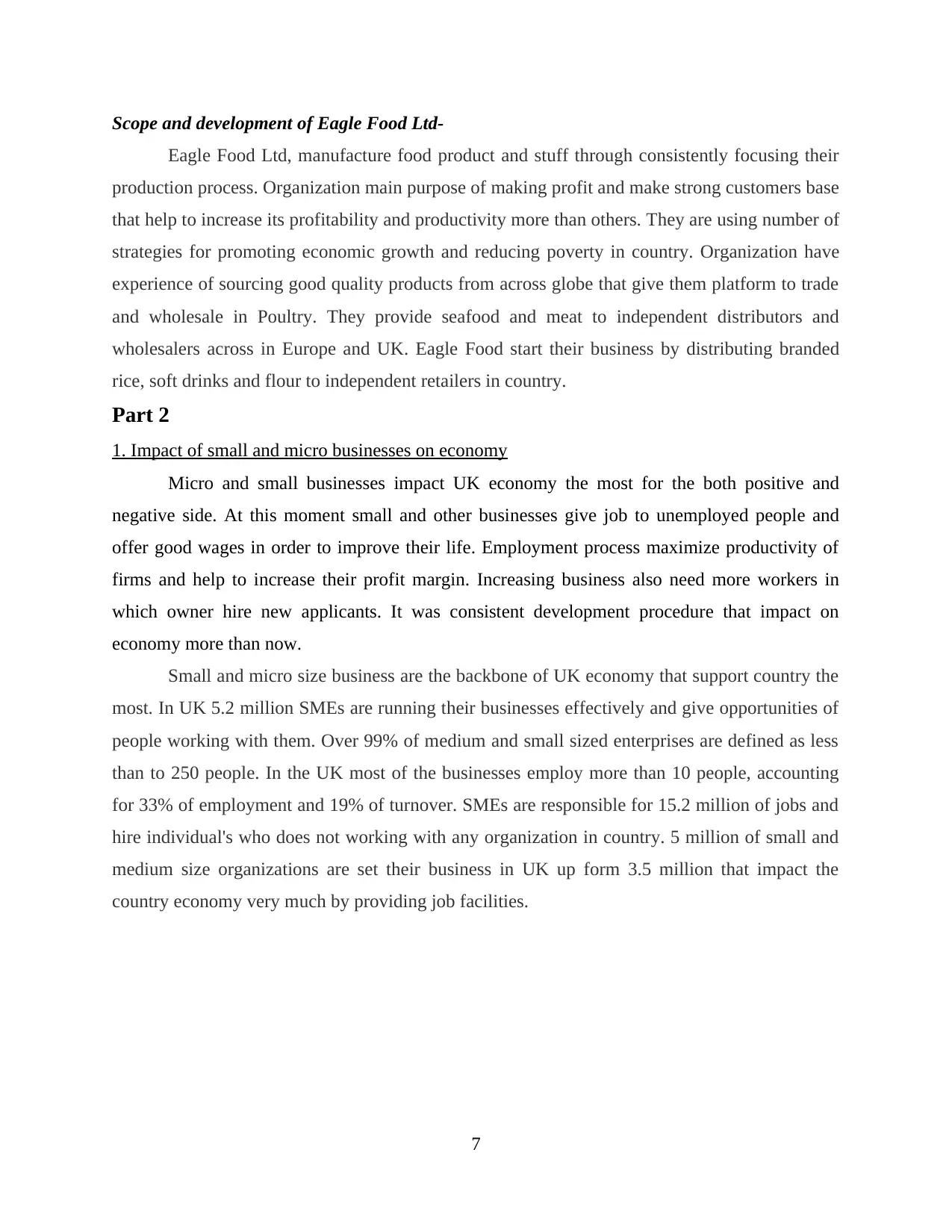
Scope and development of Eagle Food Ltd-
Eagle Food Ltd, manufacture food product and stuff through consistently focusing their
production process. Organization main purpose of making profit and make strong customers base
that help to increase its profitability and productivity more than others. They are using number of
strategies for promoting economic growth and reducing poverty in country. Organization have
experience of sourcing good quality products from across globe that give them platform to trade
and wholesale in Poultry. They provide seafood and meat to independent distributors and
wholesalers across in Europe and UK. Eagle Food start their business by distributing branded
rice, soft drinks and flour to independent retailers in country.
Part 2
1. Impact of small and micro businesses on economy
Micro and small businesses impact UK economy the most for the both positive and
negative side. At this moment small and other businesses give job to unemployed people and
offer good wages in order to improve their life. Employment process maximize productivity of
firms and help to increase their profit margin. Increasing business also need more workers in
which owner hire new applicants. It was consistent development procedure that impact on
economy more than now.
Small and micro size business are the backbone of UK economy that support country the
most. In UK 5.2 million SMEs are running their businesses effectively and give opportunities of
people working with them. Over 99% of medium and small sized enterprises are defined as less
than to 250 people. In the UK most of the businesses employ more than 10 people, accounting
for 33% of employment and 19% of turnover. SMEs are responsible for 15.2 million of jobs and
hire individual's who does not working with any organization in country. 5 million of small and
medium size organizations are set their business in UK up form 3.5 million that impact the
country economy very much by providing job facilities.
7
Eagle Food Ltd, manufacture food product and stuff through consistently focusing their
production process. Organization main purpose of making profit and make strong customers base
that help to increase its profitability and productivity more than others. They are using number of
strategies for promoting economic growth and reducing poverty in country. Organization have
experience of sourcing good quality products from across globe that give them platform to trade
and wholesale in Poultry. They provide seafood and meat to independent distributors and
wholesalers across in Europe and UK. Eagle Food start their business by distributing branded
rice, soft drinks and flour to independent retailers in country.
Part 2
1. Impact of small and micro businesses on economy
Micro and small businesses impact UK economy the most for the both positive and
negative side. At this moment small and other businesses give job to unemployed people and
offer good wages in order to improve their life. Employment process maximize productivity of
firms and help to increase their profit margin. Increasing business also need more workers in
which owner hire new applicants. It was consistent development procedure that impact on
economy more than now.
Small and micro size business are the backbone of UK economy that support country the
most. In UK 5.2 million SMEs are running their businesses effectively and give opportunities of
people working with them. Over 99% of medium and small sized enterprises are defined as less
than to 250 people. In the UK most of the businesses employ more than 10 people, accounting
for 33% of employment and 19% of turnover. SMEs are responsible for 15.2 million of jobs and
hire individual's who does not working with any organization in country. 5 million of small and
medium size organizations are set their business in UK up form 3.5 million that impact the
country economy very much by providing job facilities.
7
⊘ This is a preview!⊘
Do you want full access?
Subscribe today to unlock all pages.

Trusted by 1+ million students worldwide
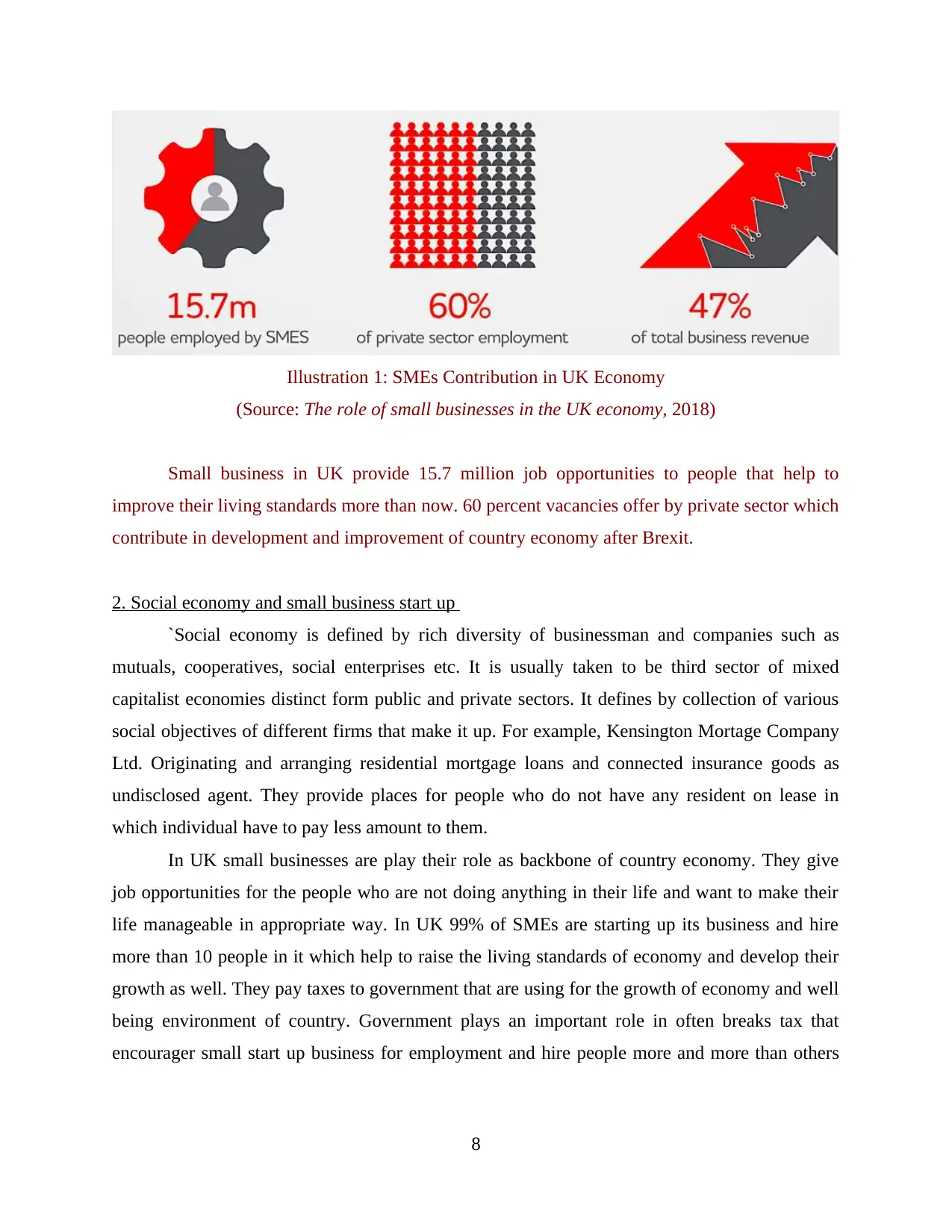
Small business in UK provide 15.7 million job opportunities to people that help to
improve their living standards more than now. 60 percent vacancies offer by private sector which
contribute in development and improvement of country economy after Brexit.
2. Social economy and small business start up
`Social economy is defined by rich diversity of businessman and companies such as
mutuals, cooperatives, social enterprises etc. It is usually taken to be third sector of mixed
capitalist economies distinct form public and private sectors. It defines by collection of various
social objectives of different firms that make it up. For example, Kensington Mortage Company
Ltd. Originating and arranging residential mortgage loans and connected insurance goods as
undisclosed agent. They provide places for people who do not have any resident on lease in
which individual have to pay less amount to them.
In UK small businesses are play their role as backbone of country economy. They give
job opportunities for the people who are not doing anything in their life and want to make their
life manageable in appropriate way. In UK 99% of SMEs are starting up its business and hire
more than 10 people in it which help to raise the living standards of economy and develop their
growth as well. They pay taxes to government that are using for the growth of economy and well
being environment of country. Government plays an important role in often breaks tax that
encourager small start up business for employment and hire people more and more than others
8
Illustration 1: SMEs Contribution in UK Economy
(Source: The role of small businesses in the UK economy, 2018)
improve their living standards more than now. 60 percent vacancies offer by private sector which
contribute in development and improvement of country economy after Brexit.
2. Social economy and small business start up
`Social economy is defined by rich diversity of businessman and companies such as
mutuals, cooperatives, social enterprises etc. It is usually taken to be third sector of mixed
capitalist economies distinct form public and private sectors. It defines by collection of various
social objectives of different firms that make it up. For example, Kensington Mortage Company
Ltd. Originating and arranging residential mortgage loans and connected insurance goods as
undisclosed agent. They provide places for people who do not have any resident on lease in
which individual have to pay less amount to them.
In UK small businesses are play their role as backbone of country economy. They give
job opportunities for the people who are not doing anything in their life and want to make their
life manageable in appropriate way. In UK 99% of SMEs are starting up its business and hire
more than 10 people in it which help to raise the living standards of economy and develop their
growth as well. They pay taxes to government that are using for the growth of economy and well
being environment of country. Government plays an important role in often breaks tax that
encourager small start up business for employment and hire people more and more than others
8
Illustration 1: SMEs Contribution in UK Economy
(Source: The role of small businesses in the UK economy, 2018)
Paraphrase This Document
Need a fresh take? Get an instant paraphrase of this document with our AI Paraphraser
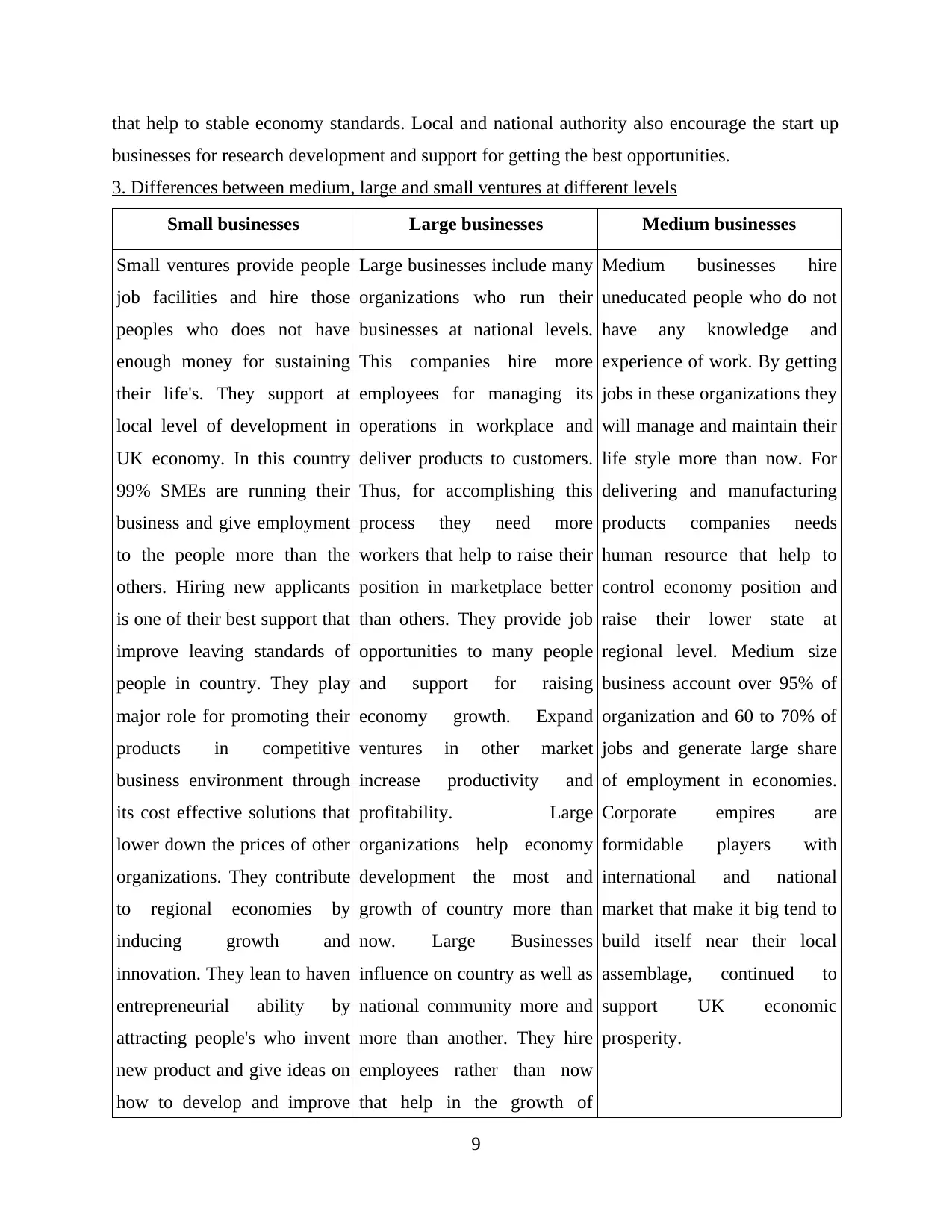
that help to stable economy standards. Local and national authority also encourage the start up
businesses for research development and support for getting the best opportunities.
3. Differences between medium, large and small ventures at different levels
Small businesses Large businesses Medium businesses
Small ventures provide people
job facilities and hire those
peoples who does not have
enough money for sustaining
their life's. They support at
local level of development in
UK economy. In this country
99% SMEs are running their
business and give employment
to the people more than the
others. Hiring new applicants
is one of their best support that
improve leaving standards of
people in country. They play
major role for promoting their
products in competitive
business environment through
its cost effective solutions that
lower down the prices of other
organizations. They contribute
to regional economies by
inducing growth and
innovation. They lean to haven
entrepreneurial ability by
attracting people's who invent
new product and give ideas on
how to develop and improve
Large businesses include many
organizations who run their
businesses at national levels.
This companies hire more
employees for managing its
operations in workplace and
deliver products to customers.
Thus, for accomplishing this
process they need more
workers that help to raise their
position in marketplace better
than others. They provide job
opportunities to many people
and support for raising
economy growth. Expand
ventures in other market
increase productivity and
profitability. Large
organizations help economy
development the most and
growth of country more than
now. Large Businesses
influence on country as well as
national community more and
more than another. They hire
employees rather than now
that help in the growth of
Medium businesses hire
uneducated people who do not
have any knowledge and
experience of work. By getting
jobs in these organizations they
will manage and maintain their
life style more than now. For
delivering and manufacturing
products companies needs
human resource that help to
control economy position and
raise their lower state at
regional level. Medium size
business account over 95% of
organization and 60 to 70% of
jobs and generate large share
of employment in economies.
Corporate empires are
formidable players with
international and national
market that make it big tend to
build itself near their local
assemblage, continued to
support UK economic
prosperity.
9
businesses for research development and support for getting the best opportunities.
3. Differences between medium, large and small ventures at different levels
Small businesses Large businesses Medium businesses
Small ventures provide people
job facilities and hire those
peoples who does not have
enough money for sustaining
their life's. They support at
local level of development in
UK economy. In this country
99% SMEs are running their
business and give employment
to the people more than the
others. Hiring new applicants
is one of their best support that
improve leaving standards of
people in country. They play
major role for promoting their
products in competitive
business environment through
its cost effective solutions that
lower down the prices of other
organizations. They contribute
to regional economies by
inducing growth and
innovation. They lean to haven
entrepreneurial ability by
attracting people's who invent
new product and give ideas on
how to develop and improve
Large businesses include many
organizations who run their
businesses at national levels.
This companies hire more
employees for managing its
operations in workplace and
deliver products to customers.
Thus, for accomplishing this
process they need more
workers that help to raise their
position in marketplace better
than others. They provide job
opportunities to many people
and support for raising
economy growth. Expand
ventures in other market
increase productivity and
profitability. Large
organizations help economy
development the most and
growth of country more than
now. Large Businesses
influence on country as well as
national community more and
more than another. They hire
employees rather than now
that help in the growth of
Medium businesses hire
uneducated people who do not
have any knowledge and
experience of work. By getting
jobs in these organizations they
will manage and maintain their
life style more than now. For
delivering and manufacturing
products companies needs
human resource that help to
control economy position and
raise their lower state at
regional level. Medium size
business account over 95% of
organization and 60 to 70% of
jobs and generate large share
of employment in economies.
Corporate empires are
formidable players with
international and national
market that make it big tend to
build itself near their local
assemblage, continued to
support UK economic
prosperity.
9
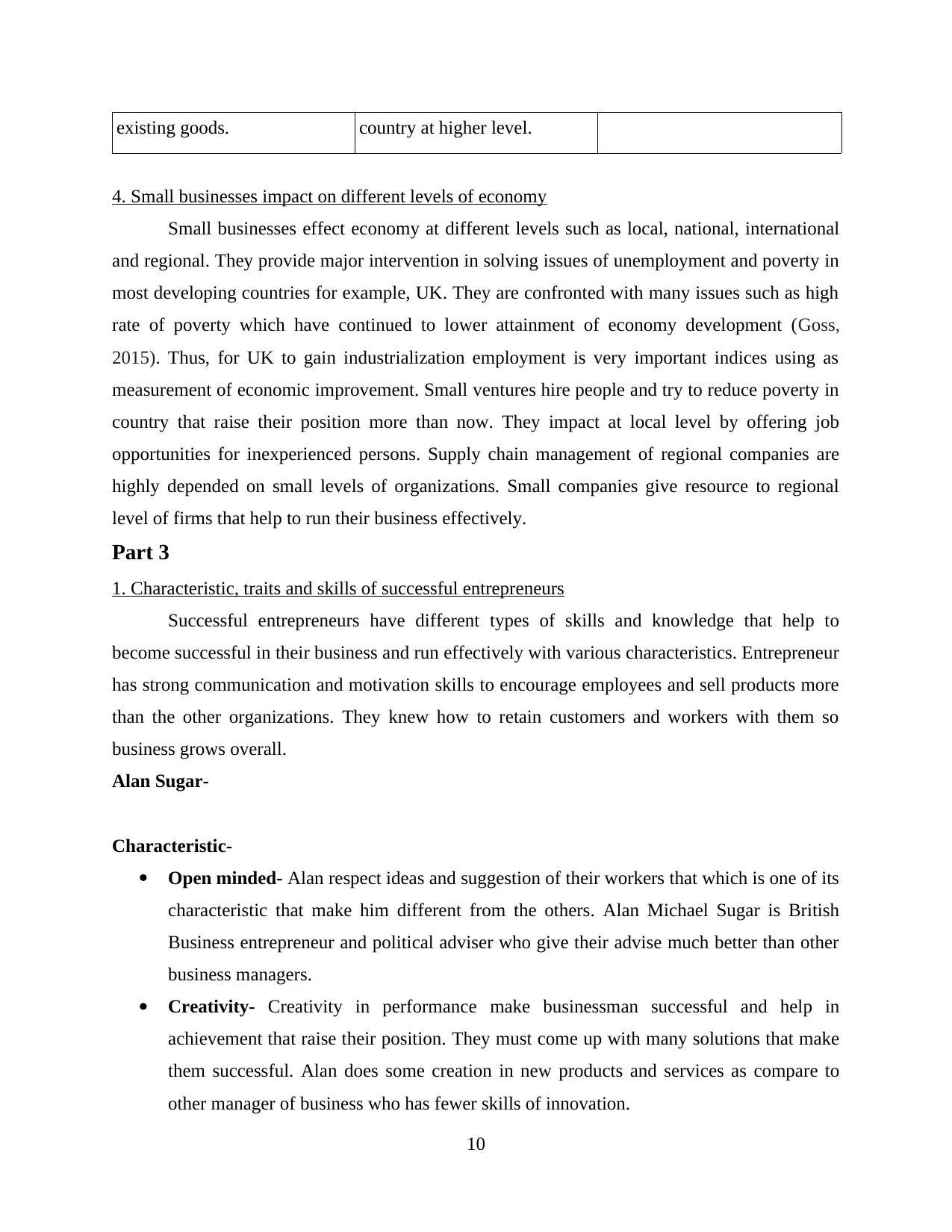
existing goods. country at higher level.
4. Small businesses impact on different levels of economy
Small businesses effect economy at different levels such as local, national, international
and regional. They provide major intervention in solving issues of unemployment and poverty in
most developing countries for example, UK. They are confronted with many issues such as high
rate of poverty which have continued to lower attainment of economy development (Goss,
2015). Thus, for UK to gain industrialization employment is very important indices using as
measurement of economic improvement. Small ventures hire people and try to reduce poverty in
country that raise their position more than now. They impact at local level by offering job
opportunities for inexperienced persons. Supply chain management of regional companies are
highly depended on small levels of organizations. Small companies give resource to regional
level of firms that help to run their business effectively.
Part 3
1. Characteristic, traits and skills of successful entrepreneurs
Successful entrepreneurs have different types of skills and knowledge that help to
become successful in their business and run effectively with various characteristics. Entrepreneur
has strong communication and motivation skills to encourage employees and sell products more
than the other organizations. They knew how to retain customers and workers with them so
business grows overall.
Alan Sugar-
Characteristic-
Open minded- Alan respect ideas and suggestion of their workers that which is one of its
characteristic that make him different from the others. Alan Michael Sugar is British
Business entrepreneur and political adviser who give their advise much better than other
business managers.
Creativity- Creativity in performance make businessman successful and help in
achievement that raise their position. They must come up with many solutions that make
them successful. Alan does some creation in new products and services as compare to
other manager of business who has fewer skills of innovation.
10
4. Small businesses impact on different levels of economy
Small businesses effect economy at different levels such as local, national, international
and regional. They provide major intervention in solving issues of unemployment and poverty in
most developing countries for example, UK. They are confronted with many issues such as high
rate of poverty which have continued to lower attainment of economy development (Goss,
2015). Thus, for UK to gain industrialization employment is very important indices using as
measurement of economic improvement. Small ventures hire people and try to reduce poverty in
country that raise their position more than now. They impact at local level by offering job
opportunities for inexperienced persons. Supply chain management of regional companies are
highly depended on small levels of organizations. Small companies give resource to regional
level of firms that help to run their business effectively.
Part 3
1. Characteristic, traits and skills of successful entrepreneurs
Successful entrepreneurs have different types of skills and knowledge that help to
become successful in their business and run effectively with various characteristics. Entrepreneur
has strong communication and motivation skills to encourage employees and sell products more
than the other organizations. They knew how to retain customers and workers with them so
business grows overall.
Alan Sugar-
Characteristic-
Open minded- Alan respect ideas and suggestion of their workers that which is one of its
characteristic that make him different from the others. Alan Michael Sugar is British
Business entrepreneur and political adviser who give their advise much better than other
business managers.
Creativity- Creativity in performance make businessman successful and help in
achievement that raise their position. They must come up with many solutions that make
them successful. Alan does some creation in new products and services as compare to
other manager of business who has fewer skills of innovation.
10
⊘ This is a preview!⊘
Do you want full access?
Subscribe today to unlock all pages.

Trusted by 1+ million students worldwide
1 out of 18
Related Documents
Your All-in-One AI-Powered Toolkit for Academic Success.
+13062052269
info@desklib.com
Available 24*7 on WhatsApp / Email
![[object Object]](/_next/static/media/star-bottom.7253800d.svg)
Unlock your academic potential
Copyright © 2020–2026 A2Z Services. All Rights Reserved. Developed and managed by ZUCOL.



